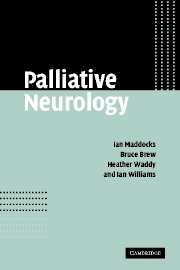Book contents
- Frontmatter
- Contents
- Foreword
- Note on drugs and abbreviations
- Section I Palliative Management
- Section II Major discomforts in advanced neurological illness
- 1 Fatigue
- 2 Problems with muscles and movement
- 3 Bulbar symptoms
- 4 Respiratory symptoms
- 5 Gastrointestinal symptoms
- 6 Urological symptoms
- 7 Pain
- 8 Cognitive, behavioural and psychological symptoms
- 9 Miscellaneous symptoms
- Section III Major neurological conditions requiring palliation
- Section IV Ethical issues
- Section V Appendices
- Index
6 - Urological symptoms
from Section II - Major discomforts in advanced neurological illness
Published online by Cambridge University Press: 08 January 2010
- Frontmatter
- Contents
- Foreword
- Note on drugs and abbreviations
- Section I Palliative Management
- Section II Major discomforts in advanced neurological illness
- 1 Fatigue
- 2 Problems with muscles and movement
- 3 Bulbar symptoms
- 4 Respiratory symptoms
- 5 Gastrointestinal symptoms
- 6 Urological symptoms
- 7 Pain
- 8 Cognitive, behavioural and psychological symptoms
- 9 Miscellaneous symptoms
- Section III Major neurological conditions requiring palliation
- Section IV Ethical issues
- Section V Appendices
- Index
Summary
Urinary symptoms may be primarily irritative, obstructive or both. Hyperreflexia leads to urgency, frequency and incontinence, and frequent bladder spasms. Hesitancy leads on to retention of urine and overflow incontinence. The aim of management is to establish the ability to retain an adequate volume of urine at low pressure in the bladder, and an acceptable routine for voiding. Long-term follow-up for patients with neurogenic bladder problems will aim to preserve renal function and avoid infections by promoting continence, acceptable bladder storage and controlled emptying while minimizing symptoms in a manner that promotes improved quality of life and self-esteem.
Some common urinary symptoms result from local pathology:
urinary infection,
vaginal wall atrophy or prolapse,
bladder tumours,
prostatic hypertrophy or malignancy or
abdominal pathology.
When neurological disorders compromise bladder control, the primary symptoms depend on the level and type of damage to the nervous system.
Incontinence is common following a stroke, due to involuntary bladder wall contraction. This may also be seen in Parkinson's disease, and in multiple sclerosis (MS). Spinal cord lesions above the level of the sacral innervation cause an initial retention of urine that may be followed by overflow incontinence and later a reflex involuntary pattern of voiding. Lower spinal lesions result in a bladder unable to contract.
Pelvic nerve damage (e.g. from diabetic neuropathy or pelvic surgery) may destroy sensations of bladder fullness and cause retention and overflow incontinence.
- Type
- Chapter
- Information
- Palliative Neurology , pp. 89 - 94Publisher: Cambridge University PressPrint publication year: 2005



